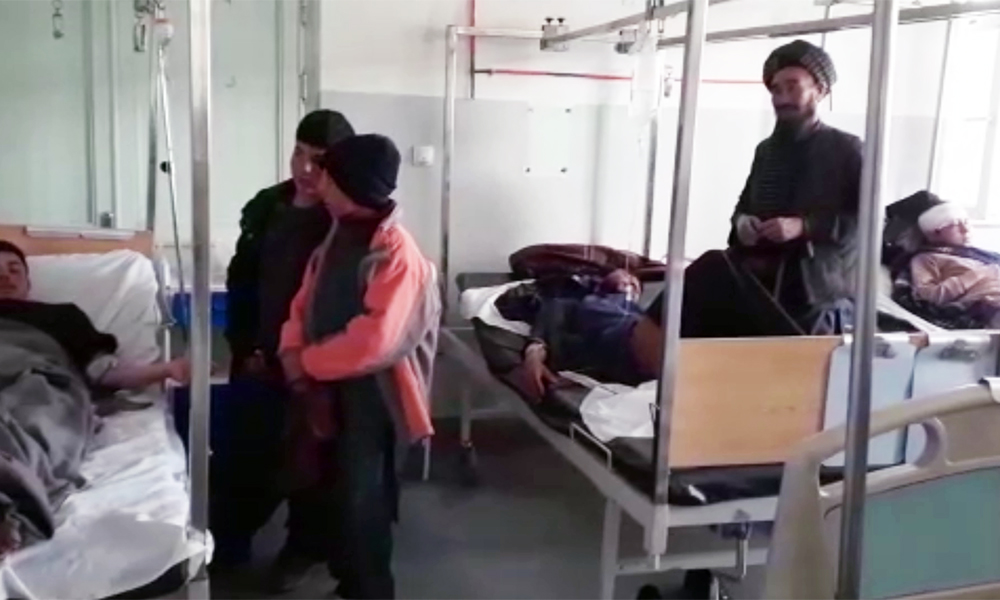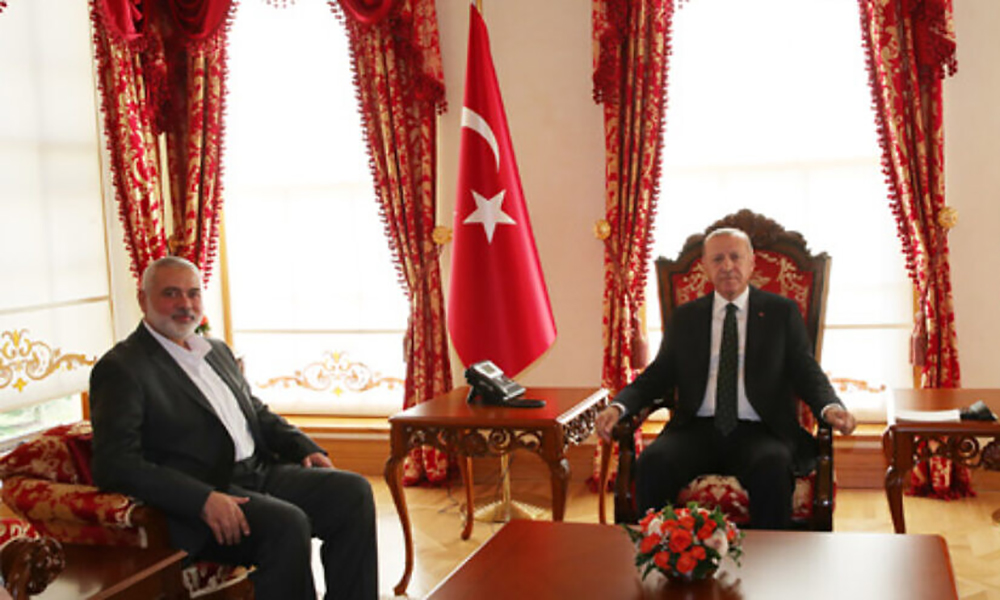Regional
One killed, 14 injured in Badghis mosque blast

One person was killed and 14 others, including children, were injured in an explosion at the Qala-e-Naw capital of the Afghan province of Badghis.
Local officials said that the blast occurred this afternoon at the gate of grand mosque in Qala-e-Naw, as worshipers were leaving the mosque.
Badghis health department Chief Asif Qanat said one person was killed and 14 others, including three children, were injured in the blast.
Mohammad Sarwari, director of Information and Culture in the province said that according to preliminary information, the incident was caused by throwing a hand grenade among worshipers.
No group has so far claimed responsibility for the blast.
In the meantime, 10 suspects have been arrested in connection with the incident.
Regional
Israeli missiles hit site in Iran, ABC News reports

Israeli missiles have hit a site in Iran, ABC News reported late on Thursday, citing a U.S. official, while Iranian state media reported an explosion in the center of the country, days after Iran launched a retaliatory drone strike on Israel, Reuters reported.
Reuters could not immediately confirm the reports.
Iran’s Fars news agency said an explosion was heard at an airport in the central city of Isfahan but the cause was not immediately known. Iran suspended flights over the cities of Isfahan, Shiraz and Tehran, state media reported.
Several Iranian nuclear sites are located in Isfahan province, including Natanz, centerpiece of Iran’s uranium enrichment program, read the report.
Tehran’s Imam Khomeini International Airport was closed to all flights until 0700 GMT, according to a notice to airmen posted on a U.S. Federal Aviation Administration database.
Some Emirates and Flydubai flights that were flying over Iran early on Friday made sudden sharp turns away from the airspace, according to flight paths shown on tracking website Flightradar24.
Israel had said it would retaliate, opens new tab against Iran’s weekend attack, which involved hundreds of drones, opens new tab and missiles in retaliation for a suspected Israeli strike on its embassy compound in Syria. Most of the Iranian drones and missiles were downed before reaching Israeli territory.
Analysts and observers have been raising concerns about the risks of the Israel-Gaza war spreading into the rest of the region.
Iran told the United Nations Security Council on Thursday that Israel “must be compelled to stop any further military adventurism against our interests” as the U.N. secretary-general warned that the Middle East was in a “moment of maximum peril.”
Oil prices and jumped on the reports of the Israeli strike. Brent crude futures rose 2% to $88.86 a barrel, the dollar gained broadly, gold rose 1% and S&P 500 futures dropped 1%, Reuters reported.
Israel’s assault on Gaza began after Palestinian Islamist group Hamas attacked Israel on Oct. 7, killing 1,200, according to Israeli tallies. Israel’s military offensive has killed over 33,000 Palestinians in Gaza, according to the local health ministry.
Iran-backed groups have declared support for Palestinians, launching attacks from Lebanon, Yemen and Iraq, read the report.
Regional
Hamas leader to visit Turkey for talks with Erdogan

Ismail Haniyeh, leader of the Palestinian Islamist group Hamas, will travel to Turkey at the weekend to hold talks with President Tayyip Erdogan, while Ankara’s top diplomat met the Hamas leader during a visit to Doha on Wednesday, Reuters reported.
Turkey, a NATO member, has denounced Israel’s offensive in Gaza and called for an immediate ceasefire. Erdogan has called Hamas a “liberation movement” while slamming the West for what he calls their unconditional support of Israel. Ankara has imposed trade restrictions on Israel.
“I will host the leader of the Palestinian cause at the weekend. We will discuss a number of issues,” Erdogan told lawmakers from his AK Party in parliament.
Haniyeh’s visit to Istanbul will be his first trip to Turkey since Israel began its campaign in Gaza on Oct. 7. It also comes amid escalating regional tensions, after Iran attacked Israel at the weekend in response to an Israeli strike on the Iranian embassy compound in Damascus on April 1.
Erdogan said on Tuesday that Israeli Prime Minister Benjamin Netanyahu and other Israeli leaders were solely responsible for the regional crisis, read the report.
In Doha, Turkish Foreign Minister Hakan Fidan met Haniyeh to discuss humanitarian aid to Gaza, ceasefire efforts and talks on hostages. Hamas said in a statement it had conveyed its views on the ceasefire negotiations and its requirements, while reviewing “the importance and centrality of the Turkish role”.
Speaking later at a press conference alongside Qatari Prime Minister and Foreign Minister Sheikh Mohammed bin Abdulrahman Al Thani, Fidan said the risk of a wider regional conflict persisted amid the Iran-Israel tensions, adding that countries which supported Israel should revise their positions.
TWO-STATE SOLUTION
He added that unity among Palestinians was needed to achieve a sovereign Palestinian state and two-state solution, and that he had conveyed Turkey’s position regarding a ceasefire in Gaza during his nearly 3-hour meeting with Haniyeh.
“We see that many actors in the West who are sympathetic to this, who want to support this idea (two-state solution) have concerns about Hamas,” Fidan said, adding that Israeli “propaganda” portraying Hamas as a terrorist group had exacerbated concerns about the group in the West.
“We exchanged views on their (Hamas’) need to openly share what sort of views, what sort of expectations they have within the solution leading to a Palestinian state to alleviate these perceptions.”
Fidan said Hamas had previously vowed to shut down its armed wing if a Palestinian state in line with 1967 borders were established, adding the group would then continue only as a political party. He said this was repeated to him during his talks on Wednesday, read the report.
Regional
Riyadh eyes significant investment in Pakistan, Saudi FM says

Saudi Arabia’s foreign minister said on Tuesday that Riyadh will be “moving ahead significantly” to invest in projects in Pakistan, days after Islamabad announced that the Kingdom had pledged to expedite $5 billion in investment, Reuters reported.
Prince Faisal bin Farhan bin Abdullah arrived in Islamabad on Monday to lead a delegation on a two-day visit as part of efforts to boost economic cooperation.
His Pakistani counterpart Ishaq Dar told a joint news conference that Pakistan gave extensive briefings to the delegation on potential investment projects.
Dar outlined areas of interest for Saudi investors such as agriculture, mining, information technology and aviation.
The prince said he was very impressed with the briefings on the investment opportunities, read the report.
“This gave us some very, very significant confidence that we will be able to move forward on those projects which we decide to identify as a worthy of investment,” he said, adding, “I am sure we will be moving ahead significantly.”
The delegation came to follow-up on the understanding reached between Prime Minister Shehbaz Sharif and Saudi Crown Prince Mohammed bin Salman during their recent meeting in Makkah Al Mukarramah to enhance economic cooperation between the two countries.
Sharif met with the crown prince last week and discussed expediting a planned $5 billion investment package, which cash-strapped Pakistan desperately needs to shore up its dwindling foreign reserves and fight a chronic balance of payment crisis.
The Special Investment Facilitation Council (SIFC), a body consisting of Pakistani civilian and military leaders set up to promote investment in Pakistan, briefed the delegates to showcase various sectors for investment, Dar said.
The visit came ahead of Pakistan seeking a 24th bailout from the International Monetary Fund. Pakistan Finance Minister Muhammad Aurangzeb is in Washington to attend the IMF, World Bank spring meetings where he will open formal talks for the new loan programme, Reuters reported.
-

 Sport4 days ago
Sport4 days agoACL fever grows as fixtures finalized
-

 World5 days ago
World5 days agoUS will not take part in any Israeli retaliatory action against Iran
-

 Latest News4 days ago
Latest News4 days agoOver 50 people dead in traffic accidents over Eid
-

 Latest News4 days ago
Latest News4 days agoUS identifies Kabul airport suicide bomber
-

 Business4 days ago
Business4 days agoAfghanistan-Kazakhstan chamber of commerce opens in Herat
-

 Latest News4 days ago
Latest News4 days agoGood rains enable DABS to increase power production in Kabul
-

 World3 days ago
World3 days agoIsraeli military vows response to Iran attack as calls for restraint mount
-

 Latest News3 days ago
Latest News3 days agoPakistani police give Afghans in Balochistan one day to leave
























